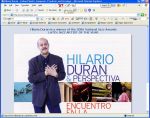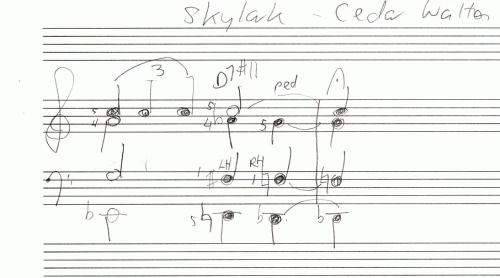Notes on Learning Jazz PianoGeoff Peters (geoff@gpeters.com) - July 1st, 2006 [View other articles]
Hilario talked about the differences between learning jazz from this transcribing process, and learning from a "jazz school" which provides a system of theoretical rules on how jazz should be played. Regarding improvisation, he said that simply figuring out the appropriate scales to play over certain chords (a common approach followed in jazz school methods), does not give the improviser the knowledge of how to compose melodic lines which span several chords. Improvisation, he said, is like composing, except it must be done instantly and in real time. He admitted that it is not easy (which is heartening to hear from a virtuoso!). Hilario also demonstrated several different styles of Cuban and Latin music, including fundamentals such as the different kinds of clave rhythms, and the basics of Montuno. But I was most fascinated with Hilario's description of how "writing down" recordings was, by the necessity of his birth country, the only way that he could have learned jazz. This led me to start thinking that, perhaps, I don't need to spend thousands of dollars to study at a jazz school, and that if I have a great deal of persistence and desire to learn jazz, I could also learn in this way. Of course, Hilario was not saying that he was entirely self-taught. He did study Cuban and classical music in Havana, and the music schools in Cuba were (and still are) some of the finest in the world. Similarly, I am not advocating abandoning music schools altogether, as I took classical piano lessons for over ten years in the Toronto Royal Conservatory program, as well as private jazz lessons for several years. I had previously heard several jazz experts expound on the benefits and methods of transcribing. There are also lots of software programs which you can use to slow down recordings, repeat certain sections, and even help identify pitches. One such program is called Transcribe by Seventh String Software. Everyone finds their own way that works best for them, so I won't go into the gritty details here. As an example, tonight I found a solo piano recording of Cedar Walton playing Skylark, from his wonderful CD, Underground Memoirs (2005). I just transcribed the first bar of the recording. (Listen to the first ten seconds here.)
The numbers I added are the fingerings I tried. If you try to play the above excerpt, you will realize that it is quite difficult, because the left hand has to stretch to play 10ths. I tried different ways to play it, such as holding the pedal down for the third chord so I can play the F in the right hand, but after listening again to the recording I came to the realization that Cedar Walton must have been reaching those 10ths with one hand. Wow! Now, having learned some things about jazz theory, I tried to analyze this excerpt with as many theoretical concepts as possible. I observed the complimentary descending lines (the inner voices and the bass line), as well as the use of the #11 to add color to the D7 chord. I have been working on trying to unify my theoretical knowledge of jazz with my ability to consciously play it, as well as listen. But after such an inspiring workshop by Hilario Duran, I am re-energized and looking forward to more adventures while exploring the universe of jazz (and other genres of) music. Links: Related Articles:
Back to Articles - This Article Copyright (c) 2006 Geoff Peters |

